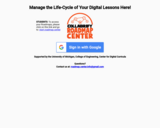
UMCDC Kindergarten MiOpenBook Chapter 5 Section 4 "Why do people trade?" (20-21)
- Subject:
- Economics
- Social Science
- Material Type:
- Assessment
- Homework/Assignment
- Lesson
- Author:
- UMCDC
- Date Added:
- 06/19/2021

UMCDC Kindergarten MiOpenBook Chapter 5 Section 4 "Why do people trade?" (20-21)
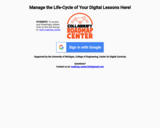
UMCDC Kindergarten MiOpenBook Chapter 6 How do people solve problems to make things better? (20-21)
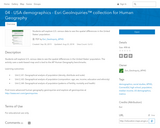
Students will explore U.S. census data to see the spatial differences in the United States' population.
GeoInquiries are designed to be fast and easy-to-use instructional resources that incorporate advanced web mapping technology. Each 15-minute activity in a collection is intended to be presented by the instructor from a single computer/projector classroom arrangement. No installation, fees, or logins are necessary to use these materials and software.
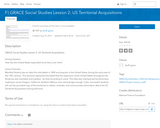
Manifest Destiny was an idea first articulated in 1845 and popular in the United States during the early part of the 19th century. This doctrine expressed the belief that the expansion of the United States throughout the Americas was inevitable and justified - by God according to some. This idea was championed by Americans seeking to annex Oregon, California, Northern Mexico and, interestingly enough, Cuba. Successful students will use the provided map of the territories to obtain, evaluate, and communicate information about the US Territorial Acquisitions during that time.
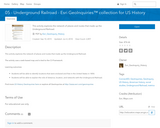
This activity explores the network of places and routes that made up the Underground Railroad.
GeoInquiries are designed to be fast and easy-to-use instructional resources that incorporate advanced web mapping technology. Each 15-minute activity in a collection is intended to be presented by the instructor from a single computer/projector classroom arrangement. No installation, fees, or logins are necessary to use these materials and software.
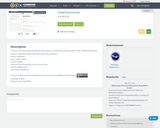
This lesson gives the teacher three options on how to have students practice their underhand throwing
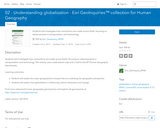
Students will investigate how connections are made across Earth, focusing on advancements in transportation and technology.

OLO: Students will be able to explain how changing the y-intercept and slope will change the appearance of the line.This lesson is to help students develop the relationship between slope(m) and y-intercept(b) by using an interactive coordinate plane to explore. This is a 2 part lesson with some teacher clarification in between the 2 parts. The teacher component in between the 2 parts is to make sure the students fully understand the relationships developed in part 1 before applying it to part 2.If you have a Face to Face class and just want a print out/editable version for Google Classroom Click Here
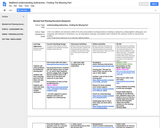
This unit explores the introduction into Subtraction using the Common Core Format (Whole-Part-Part/Missing Part) and higher level thinking. This unit is being developed because I have found that it is a hard transition for students to go from addition to subtraction. Some portions will not be accessible as it is for District Supported Accounts through our Math Curriculum, Pearson envisionMath. The students will have the opportunity to explore independently, in small groups, in whole groups and one-on-one with myself. The various clips will allow a look into how to subtract using visuals and manipulatives. Students will also explore with partners and manipulatives to gain knowledge and understanding of the concept.
Many of my students are ELL or first timers, to a school setting, since Kindergarten is not required here in Michigan. This unit takes this into consideration that we have to start at base zero as if all of the students are at a lower level. Differentiation of groups and instruction/review will take place once the material is introduced and students' working levels are observed and assessed.
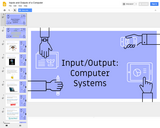
Computer science is all around us. Professionals in every field are using computer science to transform the profession. Students will learn about the basics of computer programming through engaging activities that allow the students to begin digging deeply into how a computer works. Students will analyze how a computer functions. Inputs and outputs in computers and the world around us will be studied.
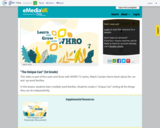
This video is part of the Learn and Grow with WHRO TV series. Watch Carolyn Harris teach about the -an and -ap word families.
In this lesson, students learn multiple word families. Students create a "Unique Can" writing all the things they can do independently.
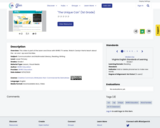
This video is part of the Learn and Grow with WHRO TV series. Watch Carolyn Harris teach about the -an and -ap word families.
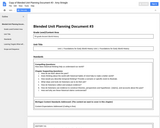
HISTORY H1 THE WORLD IN TEMPORAL TERMS: HISTORICAL HABITS OF MIND Evaluate evidence, compare and contrast information, interpret the historical record, and develop sound historical arguments and perspectives on which informed decisions in contemporary life can be based.
Compelling Questions:
How does historical thinking help us understand our world?
Chapter Supporting Questions:
How do we learn about the past?
Does thinking about the world with historical habits of mind help to make a better world?
How would you describe temporal thinking? Provide a scenario or specific event to illustrate.
What steps and tools do historians use to do their job?
How do historians collect and analyze evidence?
How do historians use evidence to construct theories, perspectives and hypotheses (claims), and accounts about the past?
How and why are these historical claims controversial?
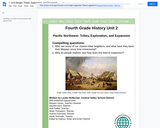
The unit has two parts. In each, students dive into inquiry to answer the compelling questions:
1. Who are some of our closest tribal neighbors, and what have they been their lifeways since time immemorial?
2. Why do people explore, and how does this lead to expansion?
Part 1 is focused on the examination of the northwest and some of the original inhabitants. Through these questions students will learn about the culture of some of their closest tribal neighbors, the Spokane Indians. The final project for Part 1 is a cultural investigation display, in which students will show what they know about the culture of the Spokane Tribe.
In Part 2, Students will also learn about forces that brought change to the northwest: fur trade era and exploration. Students will ultimately learn about the Corps of Discovery and the Oregon Trail and know the impact each had on the west. Students will finish Part 2 with a timeline activity that will reflect choice and build upon student strengths according to their skill set.
Finally, a lesson on a Tribe of the Columbia Plateau is offered as an extension, but it is strongly recommended that students get to experience this lesson.
Note that the emphasis here is on the Spokane Tribe as one of our closest tribal neighbors. In no way is this an exhaustive study nor should the tribal cultures be generalized to other tribes of the region. We understand that each tribe in our region and North America was and continues to be unique in its culture, practices, lifeways, and traditions.
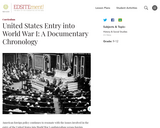
In this curriculum unit, students reconsider the events leading to U.S. entry into World War I through the lens of archival documents.
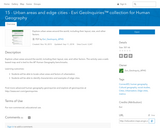
Explore urban areas around the world, including their layout, size, and other factors.
GeoInquiries are designed to be fast and easy-to-use instructional resources that incorporate advanced web mapping technology. Each 15-minute activity in a collection is intended to be presented by the instructor from a single computer/projector classroom arrangement. No installation, fees, or logins are necessary to use these materials and software.
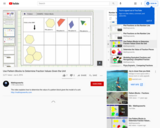
The video explains how to determine the value of a pattern block given the model of a unit.http://mathispower4u.com

Students will use the Educreation App to work on two-step equations recording their voice to explain their thinking.

As part of our functional curriculum, it is imperative that students learn how to effectively complete a job application in both paper and online format. This lesson takes place after students are able to complete a pencil-paper job application and take them through the steps to learn how to complete this process online.
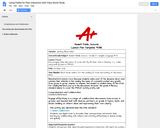
Students used Padlet walls to post thoughts/connections/questions about their reading of the historical fiction novel My Brother Sam Is Dead. Students were placed into small groups by teacher. Teacher created a Padlet wall for each small group. Group members were asked to post at least two comments per chapter of reading.